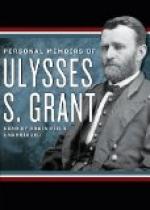Before stating what took place between General Lee and myself, I will give all there is of the story of the famous apple tree.
Wars produce many stories of fiction, some of which are told until they are believed to be true. The war of the rebellion was no exception to this rule, and the story of the apple tree is one of those fictions based on a slight foundation of fact. As I have said, there was an apple orchard on the side of the hill occupied by the Confederate forces. Running diagonally up the hill was a wagon road, which, at one point, ran very near one of the trees, so that the wheels of vehicles had, on that side, cut off the roots of this tree, leaving a little embankment. General Babcock, of my staff, reported to me that when he first met General Lee he was sitting upon this embankment with his feet in the road below and his back resting against the tree. The story had no other foundation than that. Like many other stories, it would be very good if it was only true.
I had known General Lee in the old army, and had served with him in the Mexican War; but did not suppose, owing to the difference in our age and rank, that he would remember me, while I would more naturally remember him distinctly, because he was the chief of staff of General Scott in the Mexican War.
When I had left camp that morning I had not expected so soon the result that was then taking place, and consequently was in rough garb. I was without a sword, as I usually was when on horseback on the field, and wore a soldier’s blouse for a coat, with the shoulder straps of my rank to indicate to the army who I was. When I went into the house I found General Lee. We greeted each other, and after shaking hands took our seats. I had my staff with me, a good portion of whom were in the room during the whole of the interview.
What General Lee’s feelings were I do not know. As he was a man of much dignity, with an impassible face, it was impossible to say whether he felt inwardly glad that the end had finally come, or felt sad over the result, and was too manly to show it. Whatever his feelings, they were entirely concealed from my observation; but my own feelings, which had been quite jubilant on the receipt of his letter, were sad and depressed. I felt like anything rather than rejoicing at the downfall of a foe who had fought so long and valiantly, and had suffered so much for a cause, though that cause was, I believe, one of the worst for which a people ever fought, and one for which there was the least excuse. I do not question, however, the sincerity of the great mass of those who were opposed to us.




